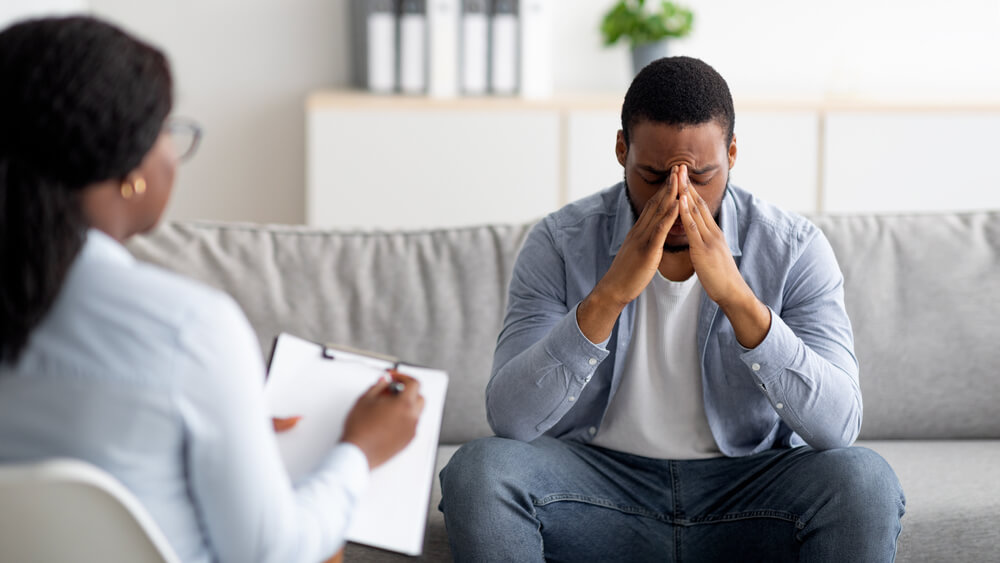Depression is a chronic condition that is one of the most common mental health conditions in the world. Yet, there are still many facets of depression that are severely misunderstood. Many people have built their own interpretation of what depression is, how its symptoms present, who it can affect, and what depression counselling entails. These misconceptions can make it difficult for individuals to recognize symptoms of depression and know what to do next.
To help build more awareness and education around depression, this article will take an in-depth look at what depression is, the causes of depression, treatment options, misconceptions, and more.
What Is Depression?
Depression is classed as a mood disorder that causes a persistent feeling of sadness and loss of interest in things and activities a person once enjoyed. It can also cause difficulty with thinking, memory, eating and sleeping.
Major life events, such as the loss of a job or grief, can trigger depressive episodes. However, depression is different from temporary negative feelings a person may feel in response to difficult life events. Depression often persists despite changes in circumstances and causes feelings that are intense, chronic and not proportional to an individual’s circumstances.
What makes depression stand out from other kinds of sadness we can experience is that it is not a single feeling but instead an ongoing one. There are various kinds of depression, with the most common being major depressive disorder. Depression can last for several weeks, months, or years.
The symptoms of depression can vary from individual to individual. Elements like how intense they are, how long episodes can persist, and how much they can affect your daily life can also vary greatly. It’s important to keep in mind that depression is treatable when you seek help. For those who do not seek treatment, it can worsen.
Are There Different Types of Depression?
Yes, there are several kinds of depression. When a person is first diagnosed with depression, there can be some unfamiliar terms. Often, depression counsellors may tell you that your depression is ‘less severe’ or ‘more severe.’ This describes how your symptoms affect you and will influence which treatments you’ll be offered. It is not uncommon for depression to change and fluctuate over time.
The different kinds of depression can include the following:
Major Depressive Disorder:
Major depressive disorder is also called clinical depression. A diagnosis of major depressive disorder is characterized by symptoms of depressed mood, loss of interest in activities, change in appetite, or sleep problems. These symptoms will persist for at least two weeks and are one of the most severe and common forms of depression.
Persistent depressive disorder (PDD):
Persistent Depressive Disorder is also called dysthymia or dysthymic disorder. This form of depression consists of less severe symptoms but lasts much longer. PDD can typically last for at least two years. A person living with PDD can experience episodes of major depression as well as milder symptoms that don’t meet all the criteria for major depressive disorder.
Perinatal Depression:
Perinatal depression refers to depression that occurs at any time, from becoming pregnant to around a year after giving birth. Two kinds of depression can be encompassed in perinatal depression. It also includes:
- Antenatal Depression: This occurs while an individual is pregnant.
- Postnatal Depression (PND): This can occur from four weeks to a year after delivering a baby.
It is less known that people can experience antenatal depression, but it is possible for some people to experience both.
Premenstrual Dysphoric Disorder (PMDD):
PMDD is a hormone-related disorder that tends to affect people’s bodies and feelings. With PMDD, a person experiences premenstrual syndrome (PMS) along with serious symptoms such as extreme irritability, anxiety, or depression. These symptoms tend to improve within a few days after your period starts but can be severe enough to affect and interfere with your daily life.
There are also specific forms of major depressive disorder, including:
Seasonal Affective Disorder:
Seasonal affective disorder is a depression that comes and goes as the seasons change. It typically occurs during the fall and winter months and then goes away or lessens during the spring and summer.
Atypical depression:
Atypical depression is also known as a major depressive disorder with atypical features. The main difference with this type of depression is that atypical depression has a temporary mood improvement in response to positive events. This temporary mood improvement is called mood reactivity. Other symptoms of atypical depression include increased appetite and rejection sensitivity.
Common Signs and Symptoms of Depression

There are many signs and symptoms of depression. Some people may experience certain ones more than others. To help make understanding the various signs of depression easier to understand, we’ve grouped them into two categories: how depression may make you feel and how it may manifest.
How You Might Feel
- Feeling sad, anxious, or “empty”
- Restless, agitated or irritable
- Guilty, worthless and down on yourself
- Empty and numb
- Isolated and unable to relate to other people
- Loss of interest in hobbies and interests you once enjoyed
- Angry or frustrated over minor things
- Decreased energy or fatigue
- Difficulty concentrating, remembering, or making decisions
- Moving or talking more slowly
- Thoughts of death or suicide or suicide attempts
How You Might Act
- Avoiding social events and activities you usually enjoy
- Self-harming or suicidal thoughts
- Difficulty speaking, thinking clearly or making decisions
- Losing interest in sex
- Difficulty remembering or concentrating on things
- Using more tobacco, alcohol or other drugs than usual
- Difficulty sleeping or oversleeping
- No appetite and losing weight, or eating more than usual and gaining weight
- Physical aches and pains with no obvious physical cause
- Moving very slowly or being restless and agitated
How Depression Presents In Males And Females
Depression can manifest differently in men, women, children, and people of all genders. How individuals express symptoms and behaviours used to cope with depression can also differ. For example, some men may show symptoms other than sadness. Instead, the primary emotion may be anger or irritability.
In some cases, mental health symptoms like depression can manifest as physical symptoms. Symptoms include a racing heart, tightened chest, ongoing headaches, or digestive problems. Men may be more likely to see a healthcare professional about physical symptoms rather than emotional ones. Men also may be more likely to use alcohol or drugs to cope.
What Causes Depression?
There is much speculation about what can cause depression, but research suggests that it is unlikely due to be one singular cause. The cause of depression can vary between people. For some, it can be a combination of several different factors or for others, there can be no reason whatsoever.
Some of the common causes of depression can include the following:
Stressful Life Events
Unwelcome, stressful or traumatic experiences can act as a trigger for depression. It’s not so much the negative experience in of themselves, but rather the coping mechanism and support systems we have in place that can affect how likely we are to experience depression.
Some examples of stressful life events include:
- Losing your job or experiencing financial hardship
- Relationship issues or the end of a relationship
- Loss of a loved one or close individual
- Major life changes: changing jobs, moving houses, or getting married
- Being physically or sexually assaulted
- Being bullied or abused, including experiencing racism
Family History
Although there is no direct evidence for a specific gene linking to depression, there is evidence supporting that if your family has experienced depression, you are at higher risk of developing depression. People with first-hand experience with a family member who has experienced depression are 3 to 10 times more likely to experience depression.
There needs to be more research into the biology of depression. Still, research suggests that the familial link may be caused by the behaviour we learn and by mirroring the coping mechanisms of the people around us.
Early Childhood Trauma
Research shows that going through difficult or traumatic experiences in your childhood can make you more vulnerable to experiencing depression later on in life. Difficult childhood traumas can affect individuals’ development of emotional coping mechanisms and stressful situations.
Some childhood experiences can include
- Physical, sexual or emotional abuse
- Neglect
- The loss of someone close to you
- Traumatic events
- An unsettled family situation
Medical Conditions
Certain medical conditions can put you at higher risk for developing depression. Health problems that are difficult to manage can affect your mood. Depression, especially in midlife or older age, can coincide with serious medical illnesses. Research suggests that people who have both depression and additional medical illnesses or conditions tend to have more severe symptoms of both.
Certain medical conditions include:
- Diabetes
- Insomnia
- Parkinson’s Disease, Alzheimer’s, and Dementia
- Thyroid and parathyroid problems
- Heart disease
- Cancer
Alcohol and Substance Use
Alcohol and substance use disorder (SUD) can contribute to a person developing depression. Substance use can alter the brain’s function and structure, which can result in a person developing a mental health condition.
Research suggests that the relationship between alcohol or substance use and depression is bi-directional, which means that people who misuse alcohol and substances are more likely to suffer from depression and vice versa.
How is Depression Treated?

Even in its most severe cases, depression is treatable. The earlier an individual seeks treatment, the more effective it is. It can feel daunting to begin depression counselling, but choosing the right practice makes all the difference. It’s important to bear in mind that no two people will have the same treatment plan for their depression counselling. There is a variety of treatments available to help people of all ages treat their depression. No matter if you are seeking treatment for yourself or someone else, working with a reliable and trustworthy psychologist can help.
Psychotherapy
One common and effective treatment for depression is psychotherapy. This can also be known as talk therapy. Psychotherapy is when an individual speaks to a trained depression counsellor to identify and learn to cope with factors that contribute to their depression.
Often, psychotherapy is used in combination with pharmaceutical treatment. There are several kinds of talk therapies, which include:
Cognitive behavioural therapy (CBT): Cognitive Behavioral Therapy is when you work with a depression counsellor to uncover unhealthy patterns of thoughts and identify how they may be influencing negative or harmful behaviour, reactions, and beliefs.
Dialectical behaviour therapy (DBT): Dialectical behaviour therapy (DBT) is similar to CBT but instead emphasizes validating and accepting uncomfortable thoughts, feelings, and behaviours instead of fighting against them. This therapy works with the theory that coming to terms with your negative thoughts or emotions allows you to change them in accordance with a recovery plan.
Psychodynamic Therapy: This form of depression counselling is designed to help individuals better understand and cope with day-to-day life. Psychodynamic therapy is based on the theory that your present reality is shaped by your unconscious childhood experiences. The goal of this therapy is to examine your childhood experiences and help you understand and cope with everyday life.
Medication
While in depression counselling, you may be prescribed prescription medication that can help change the brain chemistry that causes some forms of depression. There are several kinds of antidepressants. People may be more likely to be prescribed antidepressants if their depression is severe. Medication may be offered as a standalone treatment or in combination with another kind of therapy.
The different types of antidepressants can include:
Selective serotonin reuptake inhibitors (SSRIs): SSRIs are one of the most common antidepressants and tend to have few side effects. They treat depression by increasing the availability of neurotransmitters serotonin in the brain, which allows serotonin to have a longer effect on the brain and body.
Serotonin and norepinephrine reuptake inhibitors (SNRIs): SNRIs work similarly to SSRIs since they both increase the level of serotonin in your brain. But with SNRIs, this antidepressant also increases the norepinephrine level. Serotonin affects your appetite, social behaviour, and sexual desire, while norepinephrine affects a person’s alertness, arousal, and attention.
Tricyclics: Like SNRIs, tricyclics affect your reuptake of noradrenaline and serotonin, making their effects on your brain and body last longer.
Monoamine oxidase inhibitors (MAOIs): MAOIs work by making it more difficult for enzymes to break down noradrenaline and serotonin. This causes noradrenaline and serotonin to stay active for longer in your brain and body.
Alternative Lifestyle Therapies
There are also alternative therapies available in depression counselling. Some individuals choose to use alternative therapies in combination with traditional therapies like talk therapy and medication.
Some examples include:
Meditation: Meditation can help change the brain’s response to certain triggers of depression, stress, and anxiety. Studies have shown that meditation practices can help improve the symptoms of depression and lower the chance of a relapse.
Acupuncture: Acupuncture may help ease some of the symptoms of depression. This form of traditional Chinese medicine stimulates certain areas of the body to treat certain conditions.
Misconceptions About Depression
Depression is one of the leading diseases in the world. People who have depression still have to face many of the negative stigmas attached to mental health disorders. It’s important to recognize the facts about depression and debunk many of the misconceptions and myths that still surround depression.
“Depression isn’t a real disease. It’s all in your head.”
Many people still believe that depression is equatable to a temporary phase. When in fact, depression is a psychological, social and behavioural disorder. It is a chronic, diagnosable disorder that requires treatment to manage. Depression is not something that people can “simply shut off”. Most often, the public only recognizes the emotional side of depression. However, depression can manifest physically as well.
“Depression can only be triggered by a significant event.”
Although depression can be triggered after a difficult or traumatic event, this is not the only cause or trigger. There are many triggers for depression, and they all vary depending on the person. A significant event is not the only way to trigger depression, but it can heighten a pre-existing issue for some who have depression.
“Depression can’t occur in children. Men don’t get depressed.”
Depression can happen to anyone regardless of age, gender, economic status, or ethnicity. The symptoms of depression may manifest differently depending on a number of factors. Statistically, depression in women is higher, but not by much. Some men don’t talk about their depression as much as women, and they may avoid treatment due to negative stigmas.
“You don’t need treatment for depression. It can get better by itself.”
In order for depression to get better, it needs treatment. There are many different treatment options for depression, such as talk therapy, medication, alternative therapies, and more. Many people will try different combinations of therapies before finding one that suits them. Without depression counselling, depression can worsen in severity and length.
“Depression is the same as feeling sad.”
This is a big misunderstanding; feeling down or sad and being depressed are two different things. Depression can bring on feelings of sadness, but feeling down usually comes in temporary phases. An episode of depression can last for an extended period of time, from weeks to months to even years. Unlike feelings of sadness, depression will not go away on its own. The symptoms of depression can encompass many other emotions as well.
“Antidepressants always cure depression.”
It’s important to understand depression is not curable, but it is treatable. Antidepressants are one of the treatment options, but they are not a “fix-all” cure. For some people, antidepressants may not be enough, or their kind of depression may be more resistant to medication. Some depression counselling plans may combine different variations of treatments to fit someone’s depression best.
“Antidepressants will change your personality.”
Antidepressants have their own associations surrounding them. One of the most intimidating and most common misconceptions is that they will drastically change an individual’s personality. Although they are designed to alter a person’s brain chemistry, they won’t alter a person’s personality. Antidepressants are designed only to change certain chemicals in the brain. They help relieve symptoms of depression without affecting a person’s underlying personality.
“Talking about it only makes things worse.”
It’s a common myth that discussing depression will reinforce negative feelings, thoughts, and behaviours and keep individuals focused on the negative experiences in life. But in fact, for numerous people, it helps to seek depression counselling. Speaking with a reliable, supportive, and nonjudgemental listener can help navigate and develop healthy coping mechanisms to make living with depression more manageable.
How Is Depression Diagnosed?
If someone suspects they may have depression or have symptoms of depression, it’s highly recommended to seek professional help from a psychologist or find a practice that specializes in depression counselling. A qualified health professional can help rule out various causes, ensure an accurate diagnosis, and help provide a customized, safe treatment plan.
They will ask questions about symptoms. This can include qualifying questions such as how long they’ve been present. They also may recommend getting a physical examination to rule out other health conditions as well.
What Tests Are Done to Diagnose Depression?
Mental health professionals often ask individuals to complete questionnaires to help assess the severity of their depression. Many kinds of rating scales are used in depression counselling, such as the Hamilton Depression Rating Scale and the Beck Depression Inventory, which can be used to assess the severity and measure a person’s symptoms.
Find the Right Depression Counselling for You
Depression is a chronic medical condition affecting many people worldwide. It is not a sign of weakness or failure. It is simply a condition that requires patience and treatment. Seeking treatment can feel like a daunting step, but it is a necessary one to regain control and live your life the way you want. Finding the right psychologist is instrumental in helping you create healthy coping mechanisms to deal with the symptoms of depression.
Depression can be a catalyst for personal growth, resilience, and increased self-awareness when approached with the right support and therapeutic strategies. At Alberta Forensic Psychology, we remain committed to promoting mental well-being and offering comprehensive support to those navigating the complexities of depression, regardless of their age or life phase.
Blog posts from Alberta Forensic Psychology are for general information only. The content should not be considered medical advice. If you are in need of professional medical advice or assistance, please reach out to your local doctor or clinic.



